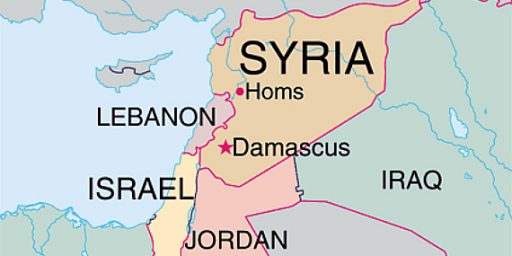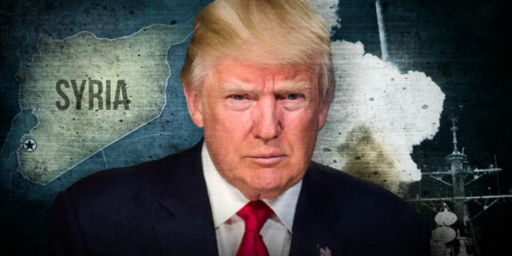Chemical Weapons Attack In Syria? Signs Point To No
Preliminary investigation seems to indicate that the attacks in Syria earlier this week that both sides claimed were chemical weapons attacks by the others did not involve chemical weapons at all:
An alleged chemical weapons attack near Aleppo yesterday, for which the Syrian regime and the opposition traded accusations of responsibility, almost certainly did not feature a lethal agent proscribed under international convention, say chemical weapons experts after considering the available evidence.
Video footage and eyewitness accounts suggest that if a chemical agent was used in a missile attack on Khan al-Aasal that reportedly killed 31 people and wounded more than 100, it was most likely a riot-control agent designed to cause irritation, which is not generally lethal.
“In the end, all I can say with confidence is that whatever the conventional or non-conventional munition was, it was not a CW [Chemical Weapons] agent as defined by the CWC [Chemical Weapons Convention],” says Charles Blair, senior fellow for state and non-state threats at the Washington-based Federation of American Scientists.
Eyewitnesses reported a powerful explosion yesterday morning in Khan al-Aasal, a village southeast of Aleppo where regime and rebel forces have battled for control.
The regime blamed Syrian opposition rebels for firing a chemically-tipped missile, while the Free Syrian Army accused Damascus of launching a Scud missile fitted with a chemical warhead. The Syrian military has fired several Scud ballistic missiles at rebel strongholds in northern Syria since December.
Securing Syria’s chemical weapons arsenal has been a matter of international concern since the uprising evolved into an armed conflict in late 2011. There are at least four suspected sites where chemical weapons are manufactured and as many as 50 storage facilities. Diplomatic and rebel sources have claimed that some of the chemical weapons stockpile has been moved to new facilities, namely in the coastal region where support for the Assad regime still runs high.
The US has warned Syria that the use of chemical weapons would constitute a “red line” requiring unspecified action. The international community is also concerned that chemical weapons could fall into the hands of radical groups.
In another indication of second thoughts over the validity of the alleged chemical weapons claim, Russia appeared to backtrack today from its initial endorsement of the Syrian regime’s position that rebels were responsible for the use of chemical weapons in Khan al-Aasal.
“The story concerning the use of chemical weapons must be meticulously investigated,” Gennady Gatilov, the Russian deputy foreign minister, said on Twitter. “For now, there is no unequivocal evidence about this.”
Within less than twelve hours after the first reports of the attack had become public, the Chairpersons of both the House and Senate Intelligence Committees were making public statements that made it seem as though they had already received confirmation that this was indeed a chemical weapons attack, and we were already hearing discussions in some quarters about U.S. intervention in the Syrian Civil War. At his press conference in Jerusalem yesterday, President Obama said that the use of chemical weapons would be a “red line” for the United States, although he didn’t specifically state what crossing that line might mean for the Syrian regime (a mistake, I suggest). Now, 24 hours later, we’ve got evidence that there was no chemical weapons attack at all.
And here I thought we’d learn something from the Iraq War debacle.





The last sentence of this blog post is DSM-level projection and transference.
In any event, whether Assad the junior uses chemical weapons or not ultimately might not be germane. It’s questionable if not doubtful it would matter.
Obama “leads from behind.” France de facto has become the tip of the spear in global geo-military matters. France presumably won’t go anywhere unless there’s oil (Libya) or an existing French proxy government (Mali). Syria possesses no oil and is not a French proxy nation. Syria is an Iranian puppet government, also backed by Russia. So, ergo, one legitmately can surmise that even if Assad overtly went full chemical warfare, a la Ypres, circa 1914-1915, that the west in general, and Obama in particular, would do nothing. C’est la vie. Arguably in any case that’s the correct result. We can’t be the world’s policeman. Especially since we’re flat broke. Using the military to protect the people of another nation is like jumping down a rabbit hole.
@Tsar Nicholas:
WTF? France controlled Syria (and Lebanon) for 26 years and in 2009, Syria exported an estimated 148,000 bbl/d of oil with 11% of it going to France.
@Timothy Watson: Can’t possibly be true. Tsar (in one of his many, apparently simultaneous careers) is a petroleum broker. If he says there is no oil in Syria, it must be so.
Or, he may be full of it. But no enquiring minds care to know.